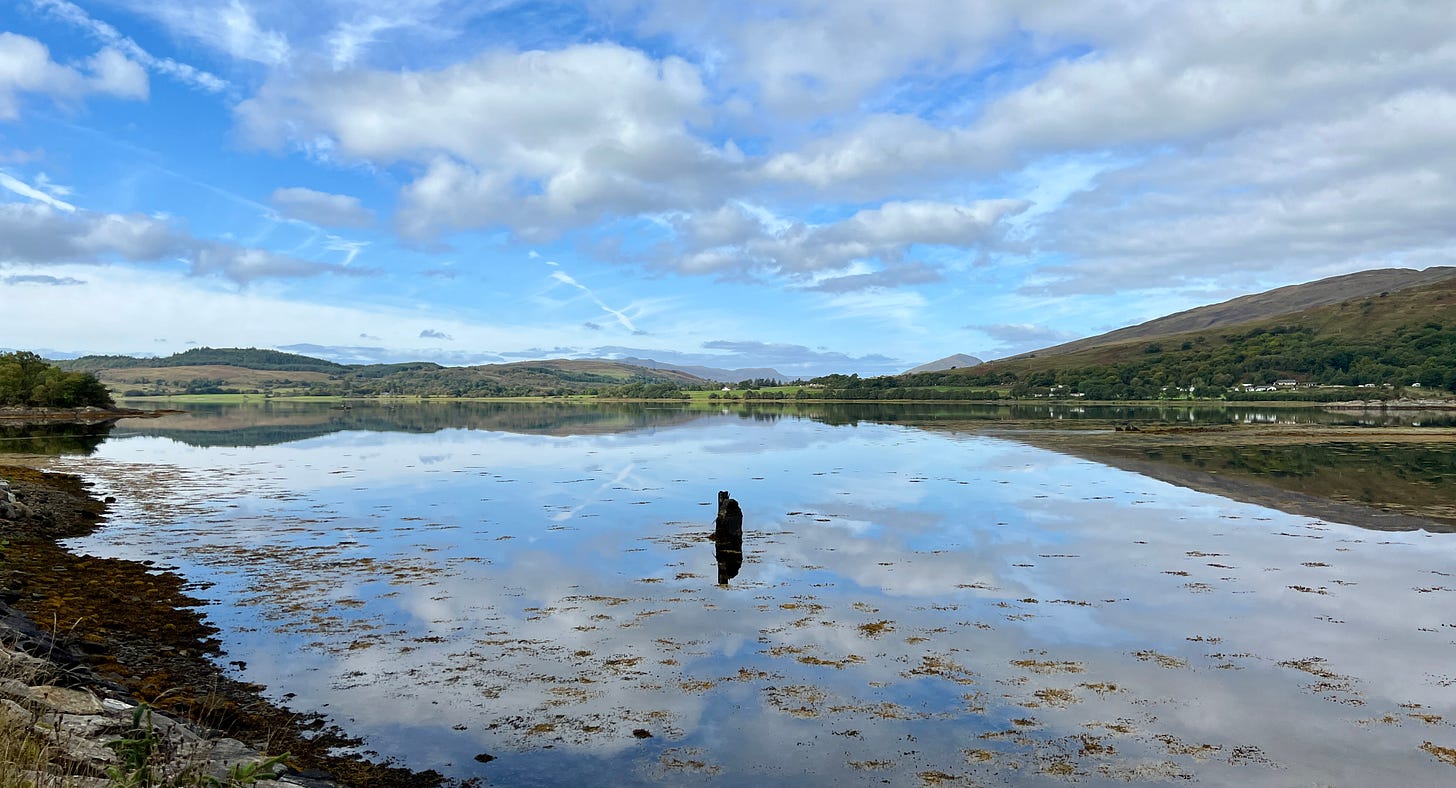TGIF :: Respond > React
#47 || The 90-Second Rule & "emotional sobriety" as tools for self-mastery
Welcome new subscribers :)
You are reading ClearLife, an exploration of what it means to live without “dimmers” such as escapist drinking, eating, snark, exercise, shopping, sex, work, drugs—even generosity—in pursuit of a more intentional, present, and embodied life. One path to this freedom is via The Eight Awarenesses. All prior posts are currently available here.
As an ongoing exploration of how living a “clear life” is a superpower, this week we explore the legacy AA term “emotional sobriety” and the newly discovered “90 second rule” and their applicability to the pursuit of durable equanimity.
One Decision vs. Countless Daily Decisions
I’m often asked: “Is it really worth it, this whole not drinking thing?”
Many grapple with (1) the pull towards alcohol-fueled socializing versus (2) knowing how good we feel, inside and out, when we abstain.
The tension is real. It’s why Ruori Fairbairns, the founder of One Year No Beer chooses to go out and drink with friends on occasion—despite his years of advocacy around living alcohol-free. There’s even a venture-backed startup, the mindful drinking app Sunnyside, that helps members of its growing global community drink less, not zero, offering “targets for you each week, which you can customize to fit your schedule and preferences.”1
Before these tools were available, I sought to moderate my “social” drinking tendencies for years—only drinking on weekends, only after a certain hour, only interspersed between tall glasses of water. These efforts worked for a while, but took a lot of energy—I was thinking about the if, the when, and the how much more than I’d like to admit. I eventually realized after an entire year “dry” that it was actually easier for me to opt out altogether. One decision. By the end of that year the advantages of living “dry” far outweighed any downsides, so I stuck with it.
What advantages?
Alcohol awareness is on the rise (see the recent PBS Newshour link at the end for some of the latest). If we want to cut back, this is a “choose your own adventure” moment. Motivators include vanity, a desire to sleep better, improved cognitive abilities, higher performance in bed or at work, and the proven links between alcohol and seven deadly cancers. It’s usually a combination of two or more that motivates a change.
At the outset of my journey in 2017, it was the desire for a clear mind and heart that fueled my 30 day break. Yet as the weeks passed, vanity kicked in—I liked the unexpected weight loss, loss of puffiness in my face, and clearer skin and eyes.
As time passed and I extended my “experiment” into 2018, the deeper benefits settled in. I discovered that I was relating to life differently. I was calmer. I could handle difficult things with greater ease. I felt more gratitude. My communications felt clearer. Yes, was still rattled from time to time, and certainly had a heavy emotional charge around my pending divorce, but I was better equipped to navigate it all.
The feeling felt like a superpower, something like: Bring it on. Let’s go. I’ve got this. Life was full of challenges (it still is), but I could handle them better than when I was drinking, even moderately. I learned later that this sensation I was experiencing is referred to as “emotional sobriety.” It’s pretty hard to go back to old ways once we’ve found this gem.
What is Emotional Sobriety?
Emotional sobriety isn’t about abstaining from escapist habits or substances. It is about having the capacity to manage difficult emotions in a healthy way, without some form of quick relief as a coping mechanism. If feels like easy access to:
I’m okay.
I’ve got this.
Everything is going to be fine.
I can do this.
This will pass.
I can respond and not react.
We’ve all been there. Something stressful or upsetting happens. Difficult feelings (fear, anger, stress, sadness) arise. We reach for relief—a snack, a smoke, a drink, a text, the television, a phone spilling over with distracting content, to avoid or soften the difficult emotion(s). We know we’re experiencing emotional sobriety when we can navigate difficulty without a crutch, and as a result, carry less tension beneath the surface.
The 90 Second Rule
This week, while recording a podcast episode with
, he shared a bit about how one of his stepping stones to clarity was learning to just feel emotions when they arose rather than avoid them with his dimmer(s) of choice way back when. For him, this meant literally sitting still on his bed, feeling what he needed to feel, and then letting the emotional wave pass. This was, of course, before folding the discipline and beauty of meditation into every facet of his life.This reminded me of something I heard while participating in the Hoffman Process: Did you know that intense emotions only last for about 90 seconds?
I did a little research to back this up. Harvard trained brain scientist Jill Bolte Taylor, author of My Stroke Of Insight, coined the notion of the 90-second rule:
“When a person has a reaction to something in their environment, there’s a 90-second chemical process that happens; any remaining emotional response is just the person choosing to stay in that emotional loop.”
According to Taylor, from a neurological perspective, we have the power to choose moment by moment how we want to be in the world.
“Essentially, when you look at cells in the circuitry of the brain, every reactivity is simply a group of cells performing their function. From the moment you have the thought that there’s a threat and that circuit of fear gets triggered, it will stimulate the emotional circuitry related to it, which is the fight-or-flight reaction. That will trigger a physiological dumpage of usually norepinephrine or anger into the bloodstream. It will flush through you and flush out of you in less than 90 seconds. So from the moment you think the thought that triggers that whole cascade of events to the chemical flushing out of you takes less than 90 seconds.”
A Powerful Tool
Simply knowing this can be a significant motivator in evolving our relationships with our dimmers and in a way, serve as a powerful shortcut to the rewards of emotional sobriety. In fact, we don’t need to be “sober” to explore this superpower, we just need to develop enough self-awareness to notice when difficult feelings arise and then choose to respond, not react.
Practices
Because, the Universe, this topic of self-mastery, emotional sobriety, and overall efforts to be more equanimous, was everywhere this week: in our Sunday Sangha, that podcast interview with Diego, and then again in a monthly zoom for venture investors, a “VC Meditation and Resilience Group” I join in my capacity as a GP for Wisdom Ventures. In each context, we discussed ways we can self-regulate when difficult experiences arise including:
Be with it. This one is my favorite. Notice the emotion. Find a way to be still and fully experience it. Let it pass. Time it if helpful (90 seconds should do it).
Express it. It won’t last forever, so find a way to let it out while it’s on fire. If you are in an accommodating setting, go ahead and scream, yell, stomp, punch a pillow, wail. The goal is to get it out of your body rather than stuff it down or avoid it altogether.
Vent. This is not asking for help, this is verbalizing an experience to someone who can listen, ideally after checking in to make sure they are in a place to receive it well.
Move. Take a quick walk or otherwise move your body to get the energy of the emotion out.
Write it down. Journaling, writing a letter than does not need to be sent, gratitude lists, “I am…” lists, whatever it is, often writing helps us move tough feelings through.
At the End of the Rainbow…
No matter what we choose to do to allow a difficulty to pass through us, the key is to pay particular attention to the urges we’ve overcome along the way. Did we resist the temptation to pick up a phone, go to the refrigerator, turn on a video, consume something for relief? The awareness alone is emotional sobriety at work and the more we do it, the more deeply we are connected to this growing superpower within us.
I’ve enjoyed plenty if benefits—and challenges—in my years of opting out of drinking. Yet this one, the occasionally successful pursuit of self-mastery, equanimity in the face of challenges, and inner calm that touches every single detail of my life in one way or another, is the pot of gold at the end of the rainbow.
Be well. ❤️
Miscellaneous…
Sangha Saturdays… The next Zoom version will be tomorrow Saturday March 9th at 9am PT and the next one after that, Saturday April 13th also at 9am PT. We will be off video tomorrow, audio only, which is a nice relief for some people. If you’d like to join, please indicate your interest here and you’ll be added to the (anonymous) calendar invitations. 🌟
The PBS News Hour… covers alcohol as one of the deadliest drugs in the United States, currently taking 500 American lives a day (<6 minutes on YouTube here). Alcohol related deaths have risen by 29% in recent years with trend lines showing far more harm for women than men. Thank you, T.M. for the share! 🙏🏼
Nurturing a daily meditation practice takes…. practice. Please consider joining Soren and me for this ongoing series, The Power of Presence, in which we welcome a range of esteemed teachers including Roshi Joan Halifax, Rhonda Magee, Jack Kornfield, Jon Kabat-Zinn, Sharon Salzberg, and coming up next week on March 15th, Dan Harris of Ten Percent Happier. We practice together for ~25 minutes then explore in a Q&A model. 🎋
Grieving Oat Milk… Loved it, but it turns out it isn’t as great for us as I thought… I was noticing my body’s reaction to it and did a little poking around and oat milk is more likely to have high sugar, pesticides, and high carbs (one cup the same as a slice of bread!) than its peers. Here’s a good round-up of the facts for the similarly curious. Onwards. #firstworldproblems 🧐
Thoughtful disclosure: Wisdom Ventures is an investor in Sunnyside.






thank you so much for this. imagining Diego sitting very still on his bed during an emotional storm was so clear and helpful. thank you... for all you continue to share...